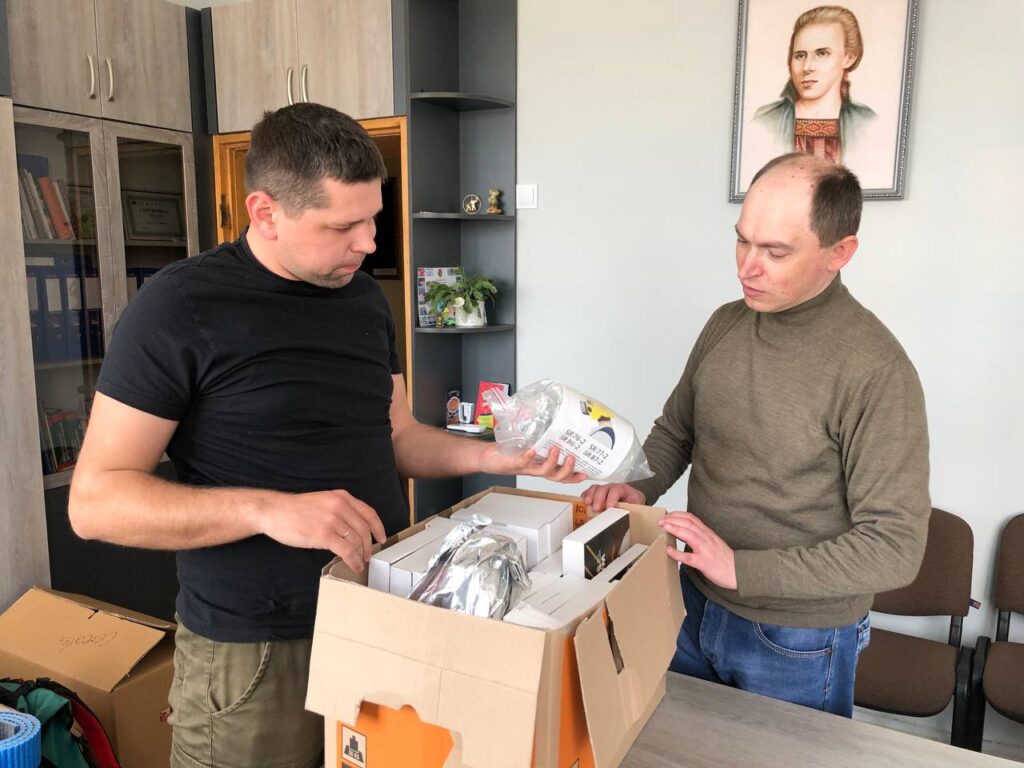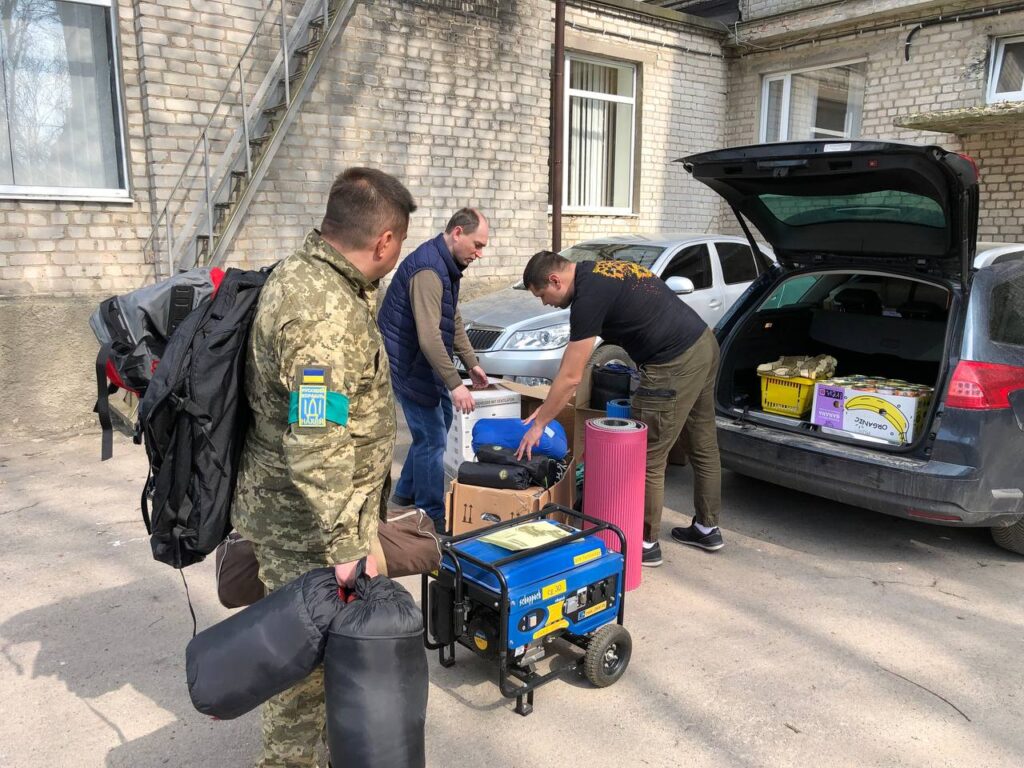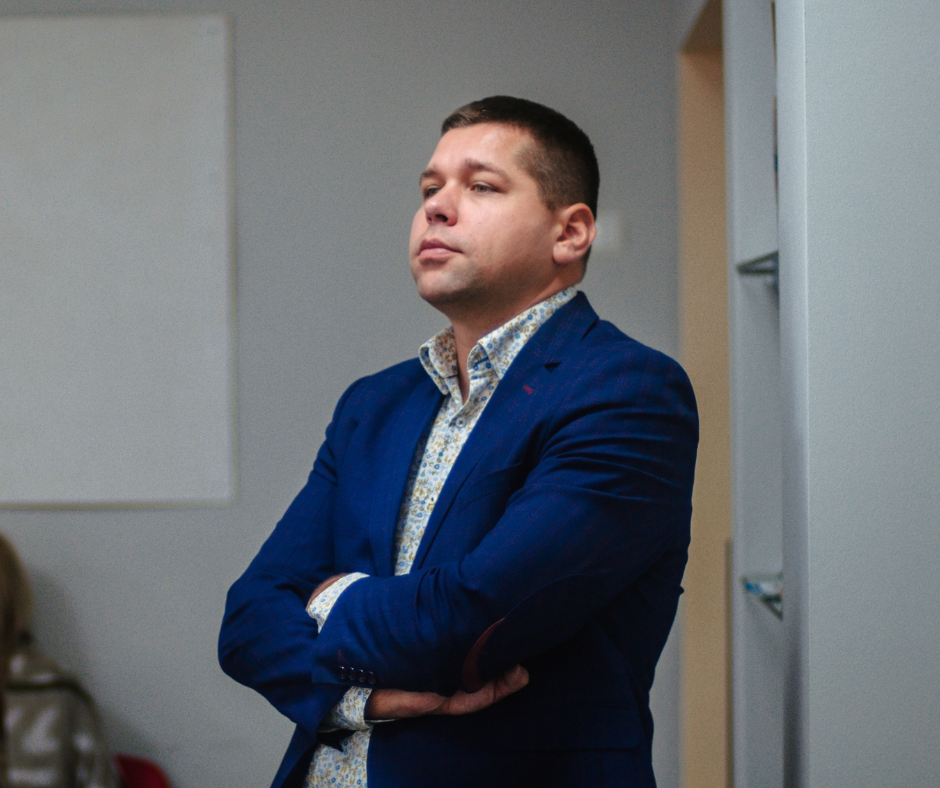Since the beginning of russia’s full-scale war against Ukraine, hundreds of Ukrainian NGOs are now facing many new challenges. Currently, some of Ecoclub’s environmental and energy projects are on hold, and we are collecting requests for humanitarian aid from Ukrainian communities. Due to collaboration with foreign partners and other volunteer staff, communities receive medicines, food, clothing, electronic devices, and other necessities.
Ecoclub publishes a series of interviews with colleagues who have partially changed their activities and are directing all their efforts to end the full-scale war, helping Ukrainian communities. Among them our colleague Dmytro Sakalyuk, the founder of the Initiative on Financial Support of Energy Managers, Ecoclub’s energy expert.
Dmytro tells how the war affected his activities, how he manages to combine volunteering with free time, and where he finds inspiration in such a difficult time.
– Dmytro, what have you been doing before the full-scale war started?
– For the past ten years, I have worked in energy efficiency, including energy management and renewable energy sources (RES). I’ve been helping Ukrainian cities to create management structures, make decisions on the development of energy management systems and implementation of energy projects, and build solar power plants. I also have been joining to commentating the legislation in this area and promoting financial instruments to promote energy efficiency and RES in municipalities (revolving funds, energy cooperatives, local energy efficiency procurement, and incentive programs).
Ecoclub helped to develop project ideas for energy cooperatives in Zhytomyr, Korosten, Polohy, Vinnytsia, and Berezdov. Also, thanks to our help, revolver funds were created in Slavuta, Klevan, and the Lublinets community.
– How did you find out about the beginning of the invasion? What were the work plans that failed due to the full-scale war?
– I slept badly that night. I found out about the invasion from a phone conversation. I woke up at 5:50 and realized that russia had launched a full-scale attack of my country.
By June, I had a pretty clear work plan. On February 25, I planned to take part in training for community leaders in Rivne region on energy management and energy monitoring. Also, among the plans, I had to visit Zhmerynka, Fastiv, Malyn, Ovruch, Korosten, Novograd-Volynsky, Sumy, and Konotop. After the results of the business trips, I planned to work with city energy managers and heads of structural units to implement measures to save energy in public institutions.
Of course, I visited some cities, but with a different purpose – humanitarian support of communities.
– What do you do now? When does your usual day start and how does it end?
– I wake up at 7:30 every day. Morning treatments, coffee (I apologize to my cardiologist and environmental activists, but now I can not live without this drink), and start working. I have a habit of always having a list of tasks for the day/week/month. It helps me structure my work and not forget anything. Recently my colleague took a picture of me on the street with a planner in my arms and laughed, asking if I was sleeping with him.
I can’t tell you about all the tasks, but among them – mostly handling large amounts of data, logistics, documentation (because no one canceled the reports), and a lot of communication with people. I also try to perform tasks related to energy efficiency and energy management. Usually I go to bed when I finish the last task from my planner.
Recently I joined the working group “Construction, Urban Planning, Modernization of Cities and Regions” of the National Council for the Recovery of Ukraine from the effects of war. Together with representatives of state and local authorities, business, and the public, we will develop a complex War Recovery Plan.
– Tell us more about the initiative to support energy managers during the war? How did the idea come up to your mind? What was the main motivation for helping?
– The initiative is intended to help energy managers who are now in difficult situations because of the war. They can receive a one-time payment of 100 euros in hryvnia equivalent.
I thought about such a fund from the first days but did not dare. Feared that I would not be able to raise enough money to support energy managers. But it’s better to try than to blame yourself for not succeeding. It has come through communication with people and listening to their tear-jerking stories. I decided to create an initiative to financially support energy managers for those who have made our country energy independent.
I didn’t come up with anything special. I just wanted to help my colleagues and friends with whom I promoted green technology and energy efficiency.
I am sincerely grateful to colleagues from Ecoclub, Energie- und Umweltzentrum Allgäu gemeinnützige GmbH, Klaus Hoppe Consulting, Olexandr Schumelda and others for their support.
– How many people responded to send money? Who are they? From which countries? What was their motivation to help?
– More than 20 people and organizations donated funds for financial support to energy managers. Some of them prefer not to reveal their first and last names.
First of all, we shared all the requests for help among colleagues working in the energy sector. In particular, we appealed to residents of Germany, Slovenia, France and Sweden who are promoting energy efficiency and the transition to RES. Ukrainians who are not involved in the energy sector also sent us their money.
– How many people have already received help? Who are they? How do they plan to use the money?
– 27 people have received our financial help. Everyone plans to use the money for basic necessities – food, medicine, clothes. Some used the funds to leave the temporarily occupied territories or areas close to hostilities. Also, in addition to or in exchange for financial help, some energy managers received some stuff – headlights, medicine, food.
Unfortunately, due to security measures, we can’t tell about everyone who received the funds. Energy managers Tetyana Stanenko from Donetsk region, Olena Danylchynko from Sumy, energy manager Denys Vorona from Nizhyn, Tetyana Usyk from Myrhorod, Oleksandr Korchma from Slovyansk, Oleksandr Karpenko from Berdyansk and Tetyana Kuchmiy from Konotop.
– Who among the energy managers continues to work in the war conditions? Are there those who have changed their activities and are now directing all their efforts to end the war?
– Many energy managers were forced to temporarily leave their homes and go to the West of Ukraine or abroad. Unfortunately, when the war is going on, it is difficult to talk about the development of energy efficiency in our country. In calmer regions, energy managers monitor energy efficiency and work with responsible people. Of course, there are those who are now in the Armed Forces of Ukraine or other structures and protect our country from invaders. We beg you, please, hold on, we’re with you!
– How can people get help from the initiative or fund money for support?
– Getting financial help is easy. If you are involved in the energy transition and need financial support – fill out the electronic form via this link (in Ukrainian). We will consider applications in the order of submission. I would like to emphasize that, above all, we support energy managers who are in the zone of fierce hostilities, in the occupied territories or in the cities that have suffered from the aggressor’s missile and bomb strikes.
Via this link (in Ukrainian), we wrote how to support energy managers during the war. Today we have 7 applications that need funding.
– What else do you do during the war? How many communities received humanitarian aid?
– During the first week, I have no particular work structure. I wanted to help with something, but I didn’t understand where I could be most useful. All the tasks seemed critical, so I tried to make any of them.
From the second week I began to be on duty at the bomb shelter and volunteer. With a wide network of energy managers across the country, we are looking for those who need help the most.
I also help transfer solar chargers of various capacities to civilians and the military who have problems with power supply.

From the first days of the war until today, I have organized the delivery of more than 140 humanitarian loads to 14 regions of Ukraine. It is possible to estimate the exact number of communities that received our help, but I use every free minute to organize the delivery of other goods.
– What is the biggest difficulty in sending humanitarian aid? How do you prioritize, if there are a large number of quests?
– The biggest difficulty in organizing humanitarian aid is the desire to help everyone who applied. I am constantly thinking about where it is best to send the humanitarian load, so that can help or save many lives. In the first weeks of the war, when I had sent a couple of humanitarian loads, I wondered if I had made the right choice. Over time, as I began to receive feedback, it became easier to organize help.
People also need moral support. Listening to different stories, I often do not know what to say. Probably it is the hardest thing for me.
When prioritizing sending humanitarian aid, I pay attention to several main factors. In particular, how many people we will help, how much the community needs, what are the risks that the load will not reach the recipient.
– Which community`s requests are the most difficult to implement?
– The most difficult thing is to work with requests from communities that ask for “everything and more.” At such moments, there are opinions that most likely such communities do not need help, if these requests do not have priority in needs and do not specify approximate calculation of different stuff. However, I try not to give in to emotions, because I understand that some villages, city councils and administrations are working under bombings. I’m always trying to figure out the real needs.
– What motivates you to continue helping communities?
– I believe that everyone should do something for our victory. I can’t shoot a weapon, but I have the skills to organize processes and I’m not afraid of manual labor.
My three- and six-year-old daughters proudly call themselves Ukrainians. There are such children in every Ukrainian community. I will help them as long as I can. I want our children to live in a free, democratic and prosperous country!

– Despite your intensive work schedule, is it possible to rest? How do you spend your free time?
I do not have much time to rest. Sometimes I play mini-football with friends, who often help me carry loads with their own cars.
Time for rest will be after the victory.
– How do you think – will support for energy managers remain after the victory?
– Before the war, the role of energy managers in communities was often underestimated. I hope that this will change later, communities will provide all the necessary things to energy managers, so our initiative will not be needed.
I have some ideas on how to transform the role of initiative after victory. I don’t know if it will be possible, but I believe in my strength and persistence, as well as in my colleagues` support from Ecoclub.
– And finally, what will your work be focused on after the victory?
– After the victory, I will spend some time with my family. I will watch how my children play, and how they eat ice cream and sweets. And then – will back to work!
I am sure that after our victory no one in Ukraine will want to be energy dependent on any country. So we need to be leaders in Europe in energy efficiency, renewable energy, and energy storage. It is important to do this without harming the environment. Therefore, I plan to take an active part in the development and commentary on legislation, development of energy management in communities, implemented “solid” (construction, repair) projects.












